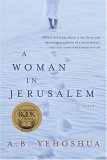Summary | Excerpt | Reviews | Beyond the book | Read-Alikes | Genres & Themes | Author Bio

From the book jacket:
Gamaliel Friedman is only a child when his family flees Czechoslovakia
in 1939 for the relative safety of Hungary. For him, it will be the
beginning of a life of rootlessness, disguise, and longing. Five years
later, in desperation, Gamaliel's parents entrust him to a young
Christian cabaret singer named Ilonka. With his Jewish identity hidden,
he survives the war, but in 1956, to escape the stranglehold of
communism, he leaves Budapest after painfully parting with Ilonka.
He settles in Vienna, then Paris, and finally, after a failed marriage,
in New York, where he works as a ghostwriter, living through the lives
of others. Eventually, he falls in with a group of exiles: a Spanish
Civil War veteran, a survivor of the Warsaw ghetto, a victim of
Stalinism, a former Israeli intelligence agent, and a rabbi—a mystic
whose belief in the potential for grace in everyday life powerfully
counters Gamaliel's feelings of loss and dispossession. When Gamaliel
is asked to help draw out an elderly, disfigured Hungarian woman who is
barely able to communicate but who may be his beloved Ilonka, he begins
to understand that a real life in the present is possible only if he
will reconcile with his past.
Comment: For 45 years, since the publication of
Night, Elie Wiesel has written more than 40 books that explore the
contemporary Jewish consciousness, and how it has been formed by the atrocities
of the 1930s and 40s. In Time of the Uprooted he explores the dichotomy
of the life of a perpetual exile, who can never be fully whole because his body
resides in one place while his spirit remains in another. Set in
modern-day New York, this bleak and somewhat disjointed novel revolves around
Gamaliel's many visits to see a dying Hungarian woman in hospital, interlaced
with stories from his unhappy life - the disappearance of Ilonka, the woman who
cared for him during the war and his wife's suicide to name but two. His
only comforts are his small circle of fellow Jews who, despite having lived in
one place for many decades, still feel rootless; his manuscript; and possibly the
dying woman, who might be Ilonka.
Some critics feel that Wiesel's themes of love , loss, faith, politics, survival
and, of course, exile, are a little too defuse; but one cannot deny the impact
of his body of work as a whole, which speaks for not only the lost
generation but those left behind, to which The Time of the Uprooted is a worthy addition,
illustrating the lasting emotional impact of the Holocaust.
![]() This review was originally published in The BookBrowse Review in September 2005, and has been updated for the
February 2007 edition.
Click here to go to this issue.
This review was originally published in The BookBrowse Review in September 2005, and has been updated for the
February 2007 edition.
Click here to go to this issue.

If you liked The Time of The Uprooted, try these:

by A B. Yehoshua
Published 2007
A tale about a beautiful woman - an anonymous victim of a suicide bombing in Jerusalem - whose luminous smile, graceful neck and bright eyes are so beguiling that even in death she can lead a man to fall in love with her.

by Dara Horn
Published 2006
With astonishing grace and simplicity, Dara Horn interweaves a real art heist, history, biography, theology, and Yiddish literature. Richly satisfying, utterly unique, her novel opens the door to "the world to come"—not life after death, but the world we create through our actions right now.
Your guide toexceptional books
BookBrowse seeks out and recommends the best in contemporary fiction and nonfiction—books that not only engage and entertain but also deepen our understanding of ourselves and the world around us.